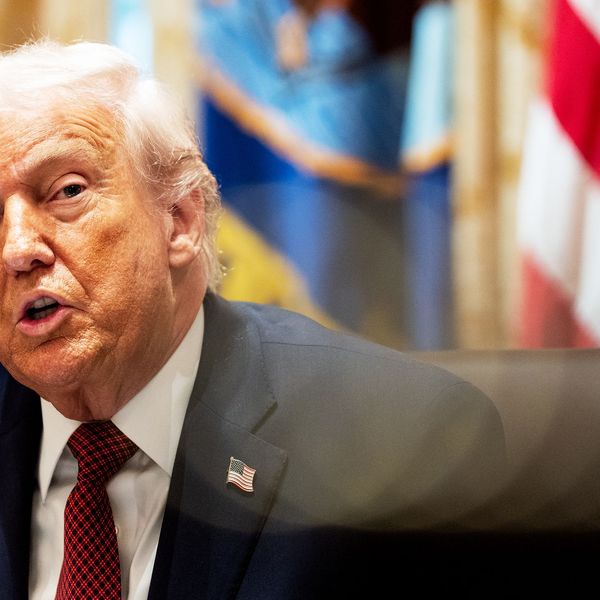On the heels of a new study showing the federal government gave short shrift to Puerto Rico relief efforts in the wake of Hurricane Maria, Sen. Elizabeth Warren (D-Mass.) on Tuesday delivered a speech on the island in which she blasted the Trump administration for its lack of respect and "cruelty" towards the Puerto Rican people.
The purpose of her talk, said Warren, who recently announced a potential 2020 presidential bid, was "to talk about the dignity and respect this island deserves from our government--and the cruelty that it has been inflicted upon."
It was 16 months ago that Hurricanes Irma and Maria battered the island, she said, yet still "the people of Puerto Rico have not received the help they need to rebuild."
Echoing other observers, Warren noted that "these storms were piled on top of a much longer-running economic devastation of Puerto Rico," and called it "a clear example of how well the federal government works for Wall Street" but not for suffering people who need it most.
She noted for example, the "vulture funds" holding the majority of the island's debt, leaving Puerto Ricans "at the mercy of Wall Street corporate executives who are focused on squeezing out every last penny of profit from this island." She also citicized the fiscal oversight board, which has been slashing "basic government services throughout the island, while generously helping out the Wall Street firms that hold your debt."
Those indignities began before the current administration--she noted the U.S. military's still-toxic caused environmental damage on Vieques. "The legacy of colonialism dies hard," Warren said. Fingering the White House's current inhabitant, she chastized President Donald Trump for blocking nutritional assistance and using his "shutdown as an excuse to delay paying out disaster recovery funds to Puerto Rico."
"Even now, even after the Trump administration has denied how many died and has dragged its feet on sending adequate disaster relief funds, the president of the United States has doubled down on the insult by toying with the idea of diverting your recovery funds to build a wall," she added, calling the barrier "dumb."
"With Trump, cruelty is not an accident," Warren said, "it is part of the plan."
Warren also appeared on CNN's "Anderson Cooper 360" on Tuesday, and reiterated the themes from her earlier talk:
In her San Juan talk, Warren outlined a number of steps to address the cruelty, including giving islanders self-determination in its association with the U.S.; strengthening unions; protecting the island "from pollution and the threats of climate change"; enacting real debt relief; creating a "Marshall Plan" for the island to rebuild; and expanding the safety net including full Medicaid funding.
She also reiterated her call for a 9/11-style commission to probe the federal government's response to the hurricanes, and said accountability for the disaster needs to include getting rid of FEMA Administrator Brock Long, whom she accused of enabling "negligence."
A new analysis may help fuel her call for that probe. Published Friday in the journal BMJ Global Health, researchers found that the government's response to the aftermath of Hurricane Maria in Puerto Rico was slower and less financially generous than its response to Hurricanes Irma and Harvey in Florida and Texas.
Storm severity can't be the explanation, the study noted, as "Hurricanes Harvey and Irma made landfall as category four hurricanes, and Maria hit Puerto Rico as a 'high-end' category 4, or just below the threshold of a category 5 hurricane. Maria caused more damage in Puerto Rico than Irma in Florida or Harvey in Texas in terms of loss of electricity and housing destruction, with overall damage estimates comparable to Harvey, and greater than estimates for Irma."
Regardless of any possible justified barriers to response time, the researchers said "what cannot be contested is that the responses were in fact different across critical time points, and these differences have serious consequences for acute and long-term health outcomes and recovery efforts."



